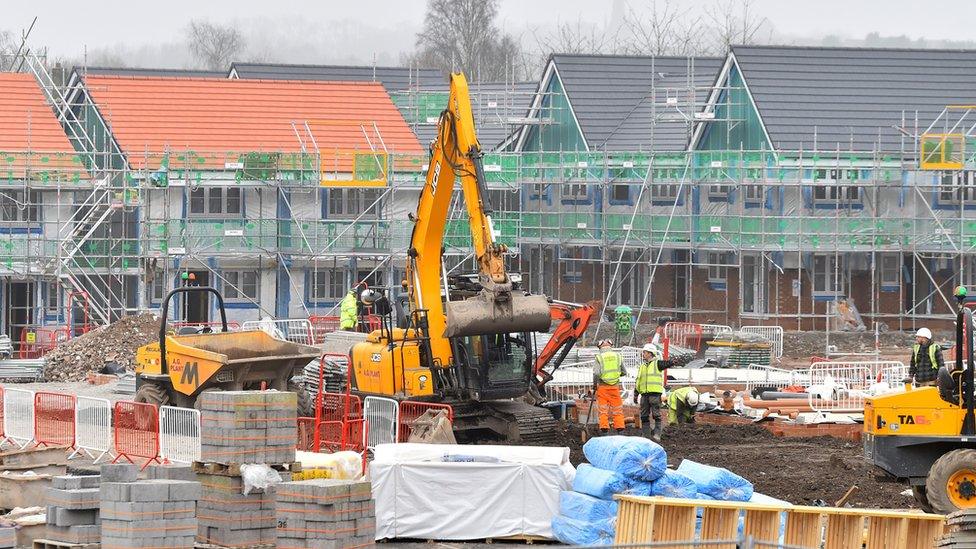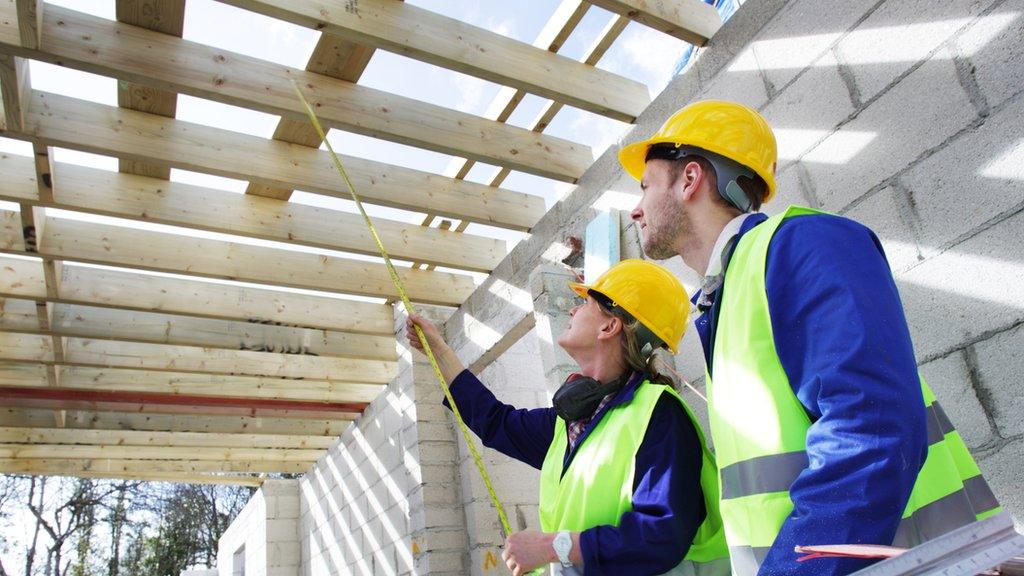Housing targets to be diluted after revolt from Tory MPs
- Published
- comments

The government has agreed to water down housing targets for local councils, in order to put down a rebellion from Conservative MPs.
Nearly 60 rebels had pledged to back a plan to ban mandatory targets in England, delaying votes on the Levelling Up Bill.
Housing Secretary Michael Gove has now offered councils more flexibility over meeting the government-set targets.
Rebels had argued they are excessive, and undermine local councils.
Former minister and leading rebel Theresa Villiers said the government's plans were a "compromise" that would "rebalance" planning rules.
Other Conservative MPs had expressed concern about the rebels' plans, warning they would lead to fewer homes being built.
The public accounts committee has said the government is unlikely to meet its housebuilding targets and not enough socially-rented homes are being built.
The government said Mr Gove had now agreed to give councils more leeway to depart from government housing targets.
In a press release, the Department for Levelling Up said the targets would become a "starting point" for development, with new flexibilities to "reflect local circumstances".
These targets, calculated using a government formula, have to be incorporated into councils' 15-year housebuilding plans. Councils that fail to do so can have their power to block new developments curbed.
The government is yet to set out the changes in detail, with the Department for Levelling Up promising to do so on Tuesday.
Isle of Wight MP Bob Seely, another prominent rebel, said ministers had agreed that councils should be able to take an area's density and "existing character" into account when applying the targets.
Holiday lets
In another concession to rebels, the government has also agreed to introduce registration schemes for holiday lets.
A consultation will also be launched on making homeowners get planning permission to convert their homes for tourist use.
Holiday rentals have been a big issue in a number of rural beauty spots, with MPs representing them complaining of a big expansion in lets during the Covid pandemic pushing up housing prices for locals.
The rebels also say Mr Gove has agreed that councils with an up-to-date local housebuilding plan won't have to set aside a rolling five-year stock of land for future development.
This planning requirement, designed to make sure councils allocate enough land to fulfil their targets, had also been unpopular with rebels, who had backed a plan to scrap it completely.
Speaking to reporters, Mr Gove said the government's proposed changes would help it meet its target of building 300,000 homes a year by the mid 2020s.
He added, however, that the pledge would be "difficult" to deliver in the next year because of the economic slump and rising inflation.
But Labour's shadow levelling up secretary Lisa Nandy said the government's plans for housing targets were "unconscionable in the middle of a housing crisis".
She added that the government was "weak," adding that the prime minister and Cabinet "are in office but not in power".

Sunak's authority takes a hit

Conservative rebels claimed to have the support of at least 100 MPs who were willing to vote against the government.
Whether genuine or not, Rishi Sunak couldn't afford to risk a rebellion of that size.
I'm told the deal with the rebels was done towards the end of last week - and that there's concern in government that the changes would now mean significantly fewer homes get built.
Both backbenchers and ministers are claiming this compromise is a success, but there's no doubt prime minister's authority has taken a hit.
Ministers accept the manifesto pledge to build 300,000 homes a year by the mid-2020s will now be difficult, blaming inflation, though there's no doubt these changes won't help.
Few at Westminster disagree with the need to build more homes, but this tussle over targets has shown it's far harder to reach a consensus on how and where.
Next in the government's bid to get its Levelling Up Bill through Parliament is a battle over onshore windfarms, another notoriously divisive subject on which Conservative MPs don't see eye to eye.

The government is falling short of its housebuilding targets by 32,000 homes from its original 2016 and 2021 goals for affordable homes, a report by the public accounts committee published on Wednesday has revealed.
MPs on the committee have noted that amongst all the building targets there is not one for affordable or socially rented homes.
Committee chair Dame Meg Hillier said local authorities know where and what type of homes need to be built "to address the national housing crisis but don't have the power to act".
"The human cost of inaction is already affecting thousands of households and now the building programme is hitting the challenges of increased building costs," she said.
Related topics
- Published2 August 2024
